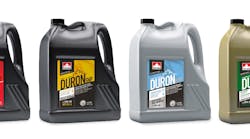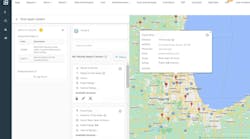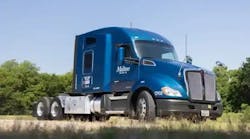Petro-Canada Lubricants rolled out its new DURON CK-4 and FA-4 diesel engine oil line this week; oils that will officially become available to the trucking industry on December 1 this year.
The company’s CK-4 and FA-4 blends – formerly known as PC-11A and PC-11B – will be available in four performance tiers: DURON HP (High Performance); DURON SHP (Super High Performance); DURON UHP (Ultra High Performance); DURON Advanced, the firm’s FA-4 blend.
Brian Humphrey, OEM technical liaison with Petro-Canada Lubricants, explained to Fleet Owner that new package labeling, bottle color and user friendly symbols will help trucking customers choose the right oil for their needs as well as understand specific “enhanced benefits” each blend will provide, such as extended drain intervals, higher fuel economy or extreme temperature protection.
He added that the American Petroleum Institute (API) recently released two new service symbols or “donuts” which clearly distinguish between the CK-4 and FA-4 blends, yet stressed that oil marketers are allowed to use any color they choose for the donut itself.
“We recommend visiting http://www.api.org/ to familiarize yourself with the different symbols before the December 1 launch,” Humphrey said.
He also provided Fleet Owner with additional insight about these new oils:
When is it best to use FA-4 vs. CK-4? What conditions duty cycles need to be considered?
Humphrey: The first consideration in all cases is to follow the recommendations of the engine OEM on oil type, viscosity and the operating duty cycle.
Beyond the OEM recommendations, it’s worth keeping in mind that the primary difference between FA-4 and CK-4 is the level of High Temperature High Shear or “HTHS” viscosity.
FA-4, which is specifically designed for newer vehicles, provides a slightly lower HTHS which enables an improvement in fuel economy due to lower “viscous drag” from the oil. Future heavy duty fleet vehicles will be designed to comply with this specification to offer even higher levels of efficiency.
CK-4, on the other hand, will offer backwards compatibility, allowing for use in the vast majority of older heavy duty diesel engines while still offering increased performance and protection gains.
Provide a short explanation of why FA-4 helps improve fuel economy – how does a thinner viscosity engine oil do that?
Humphrey: Our FA-4 category oils have been specially designed to cope with the pressures of hotter-burning, more fuel efficient and low emissions diesel engines currently in use.
The oils in this category have been formulated with the lowest HTHS viscosity levels we have ever seen. As noted before, lower oil viscosity means less “viscous drag” in the engine. This allows them to run more efficiently and use less fuel, while still offering improved levels of wear protection.
It’s important to remember FA-4 products are expected only to be recommended in new engines that specify their use. This is because older engines are not designed to operate with such low HTHS oils.
If your particular operating conditions push the limits of higher temperatures due to high loading, elevated ambient temperatures, or restricted cooling, then you may actually wish to forego the extra fuel economy benefits associated with FA-4 in favour of the added film thickness of CK-4.
Likewise, if your conditions are extremely dirty with excessive particles in the oil, CK-4 may be a safer choice for that equipment.
Fleet managers will need to consider which oil category is most suitable for their vehicles depending on the age of their trucks and their particular operating conditions.
For those with a mix of older and newer equipment and an ambition to realize the improvements that will come with the new classification, then a stock of both CK-4 and FA-4 products may be the best choice.
Is engine displacement a factor in choosing which oil to use?
Humphrey: Engine displacement in itself is not a factor when choosing between CK-4 and FA-4 oils. FA-4 oils are primarily going to be recommended for newer engines.
What kind of drain intervals can be expected with the two oils roughly?
Humphrey: Both CK-4 and FA-4 oils will provide extended drain capabilities similar to their CJ-4 predecessors. Actual oil drain intervals will depend on the severity of service and type of application.
It is recommended that fleet managers refer to their engine owner’s manual and utilize oil sample analysis data when exploring whether and how far to extend drains for their operations.
If by accident FA-4 gets mixed with CK-4 in the engine will there be problems?
Humphrey: CK-4 and FA-4, like most engine oils, are fully compatible which each other and mixing them in any ratios should not be an issue. That said, a good maintenance practice is to complete a thorough oil flush of the engine when changing oil types.




